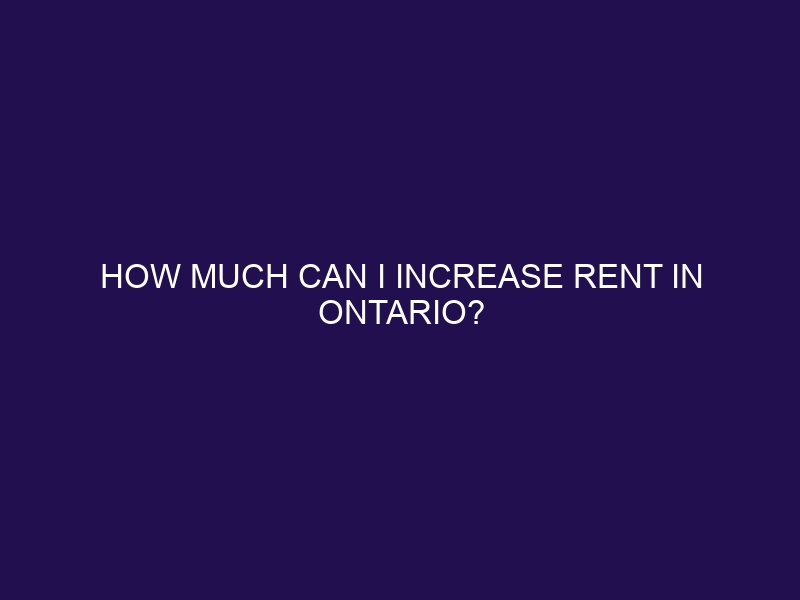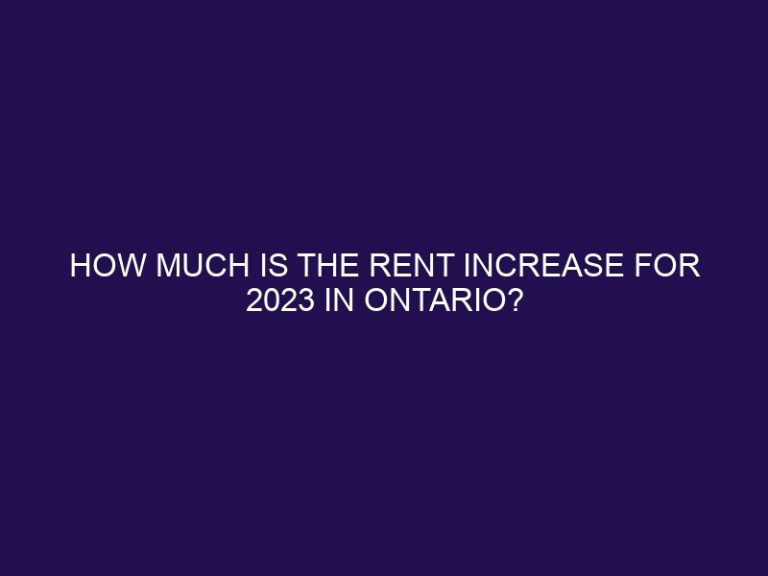How much can I increase rent in Ontario?
.jpg)
Rent increase regulations and laws can vary depending on the jurisdiction. In Ontario, Canada, there are specific laws governing rent increase to protect tenants and ensure affordable housing options. If you are a landlord or a tenant in Ontario, it is crucial to be aware of these regulations to understand the allowable rent increase and the process involved.
The laws and regulations regarding rent increase in Ontario encompass various aspects, including the rent increase guideline, rent control exemptions, factors determining the allowable rent increase, and the process for increasing rent. Understanding these guidelines can help both landlords and tenants navigate the rental market and maintain a fair and transparent rental process.
To determine how much you can increase rent in Ontario, it is essential to consider the annual rent increase guideline set by the government. This guideline specifies the maximum percentage by which landlords can increase the rent annually. However, there are certain exceptions and special circumstances where landlords may be allowed to increase rent above the guideline.
Factors that determine the allowable rent increase in Ontario include rent control exceptions, special circumstances, market rent analysis, and capital expenditures. Rent control exceptions may arise for new rental units, while market rent analysis helps assess the current rental market conditions. Capital expenditures, such as renovations or repairs, can also impact the allowable rent increase.
To increase rent in Ontario, landlords must follow a specific process, which includes providing proper notice to tenants and submitting the rent increase form to the Landlord and Tenant Board. It is important to adhere to the guidelines and timelines outlined in the rental laws to ensure a legal and fair rent increase.
While there are regulations governing rent increases in Ontario, it’s important to note that there are limitations as well, such as rent control exemptions and specific circumstances where the rent increase may be limited or denied. Tenants facing a rent increase can explore options such as negotiating with the landlord or seeking assistance from tenant rights organizations.
Both tenants and landlords should familiarize themselves with the laws and guidelines surrounding rent increases in Ontario to ensure a smooth and transparent rental process. By understanding the regulations, following the proper procedures, and seeking legal advice if needed, both parties can navigate and resolve any issues related to rent increases effectively.
Key takeaways:
- Rent increase guideline: Ontario has an annual rent increase guideline that determines the maximum percentage by which landlords can increase rent each year.
- Above guideline rent increases: Landlords in Ontario can apply for above guideline rent increases if they have incurred valid expenses or made necessary repairs that justify a higher rent increase.
- Factors determining allowable rent increase: The allowable rent increase in Ontario is influenced by factors such as inflation, market conditions, and costs related to operating the rental property.
What are the Laws and Regulations Regarding Rent Increase in Ontario?
In Ontario, knowing the laws and regulations surrounding rent increases is crucial for landlords and tenants alike. So, let’s dive into what you need to know about rent increase guidelines and rent control exemptions. Get ready to explore the dos and don’ts, the limits, and the exceptions when it comes to raising rent in Ontario. Stay informed and avoid any legal pitfalls as we unravel the complexities of the rental landscape in this province.
Rent Increase Guideline
The Rent Increase Guideline in Ontario provides landlords with the maximum percentage they can increase rent each year. Here are some key points about the guideline:
- The Rent Increase Guideline is set by the government and is applicable to most residential rental properties.
- For 2023, the guideline is 1.2%, meaning landlords can increase rent by up to 1.2% for eligible properties.
- Landlords must give tenants at least 90 days’ notice before implementing a rent increase.
- The guideline ensures that rent increases are fair and reasonable, preventing excessive or unfair hikes.
- Landlords may be eligible for Above Guideline Rent Increases (AGIs) if they can prove certain extraordinary expenses or capital investments.
Following the Rent Increase Guideline helps maintain a balance between protecting tenants and ensuring landlords can cover reasonable costs.
Rent Control Exemptions
Rent control exemptions in Ontario provide certain circumstances where landlords can increase rent beyond the annual guideline. Here are some instances of rent control exemptions:
-
Capital expenses: Landlords have the option to apply for above guideline increases to recover costs for major repairs or renovations.
-
Utilities: If there has been a significant increase in the cost of utilities, landlords are allowed to request a rent increase to cover these expenses.
-
Property tax increases: Landlords can pass on property tax increases to tenants by applying for an above guideline increase.
-
Operating costs: In situations where operating costs have gone up, landlords may qualify for an above guideline rent increase.
To deal with rent control exemptions, tenants are advised to understand the rules and regulations, seek guidance from a tenant advocacy group or legal professional, and engage in negotiations with the landlord to establish equitable terms.
How Much Can I Increase Rent in Ontario?
In Ontario, landlords can increase rent annually based on the rules set by the provincial government. As of 2022, the maximum allowable rent increase is 1.2%, calculated using a formula established by the Ontario Rent Increase Guideline. How Much Can I Increase Rent in Ontario? Landlords must provide tenants with at least 90 days notice before implementing the rent increase. There may be exceptions to the guideline, such as newly constructed rental units or units that have undergone significant renovations. It is important for landlords to familiarize themselves with the regulations to ensure they are following the proper procedures when increasing rent in Ontario.
Annual Rent Increase Guideline
The Annual Rent Increase Guideline in Ontario determines the maximum percentage by which landlords are allowed to increase rent each year. The guideline is set by the government and is based on the Consumer Price Index (CPI). For 2021, the guideline is set at 1.5%. This means that landlords can increase rent by a maximum of 1.5% for existing tenants, as long as they provide proper notice in accordance with the Residential Tenancies Act. Landlords must follow this guideline unless they have obtained an exemption or are eligible for an above guideline increase. It is important for both landlords and tenants to be aware of this guideline to ensure compliance with the law.
Above Guideline Rent Increases
Above guideline rent increases can occur in certain situations in Ontario where landlords are permitted to raise the rent beyond the annual rent increase guideline. This can take place when landlords have undertaken significant capital expenditures on the rental property or encountered increases in operating costs.
During the application process for an “above guideline rent increase,” landlords must give proper notice to the tenants and submit a rent increase form to the Landlord and Tenant Board. The Board will evaluate various factors such as the reason for the increase, the requested amount, and the impact on the tenants.
For landlords, it is crucial to adhere to the legal process and provide valid justifications for “above guideline rent increases” to ensure compliance with Ontario’s rent control regulations.
What Factors Determine the Allowable Rent Increase?
The allowable rent increase in Ontario is determined by several factors. These include the annual rent increase guideline set by the government, which for 2023 is 1.2%. Landlords can also apply for above guideline rent increases in certain circumstances, such as if they have made significant repairs or renovations. The Rental Housing Tribunal will consider factors like the age and condition of the building and the costs incurred by the landlord. It is important for landlords to provide proper notice and submit the rent increase form to ensure compliance with the regulations. Considering these factors will help landlords determine the allowable rent increase in Ontario.
What Factors Determine the Allowable Rent Increase?
What is the Process for Increasing Rent in Ontario?
In Ontario, understanding the process of increasing rent is essential for both landlords and tenants. So, let’s dive into how you can go about increasing rent in Ontario. We’ll explore the importance of providing proper notice and the necessary steps involved in submitting the rent increase form. By the end, you’ll have a clear understanding of the process and be equipped with the knowledge to navigate this aspect of the rental market. Let’s get started!
Providing Proper Notice
When increasing rent in Ontario, it is essential to provide tenants with proper notice. This ensures transparency and allows them to prepare for the adjustment. The Residential Tenancies Act in Ontario mandates landlords to give at least 90 days’ written notice prior to implementing any rent increase. Landlords must clearly state the amount of the increase and specify the effective date. Failure to provide proper notice can result in legal disputes and potential penalties. By adhering to these guidelines, landlords can uphold a positive landlord-tenant relationship and comply with Ontario’s legal requirements.
Submitting the Rent Increase Form
In Ontario, landlords must ensure that they follow all the necessary steps for properly submitting the rent increase form. Below is a comprehensive guide on how to do so:
- First and foremost, landlords should obtain the appropriate form from either the office or the website of the Landlord and Tenant Board.
- Next, carefully complete all the required information on the form, including the tenant’s name, address, and the current amount of rent being paid.
- Specify the new rental amount along with the effective date of the proposed increase.
- Additionally, it is crucial to provide a clear explanation detailing the reason behind the decision to raise the rent.
- A crucial step to remember is ensuring that the completed form is submitted to the tenant at least 90 days in advance of the proposed effective date of the increase.
- Lastly, it is important for landlords to retain a copy of the submitted form for their own records.
By diligently following these steps and properly submitting the rent increase form, landlords in Ontario can confidently adhere to the regulations.
Are There any Limitations on Rent Increases in Ontario?
Yes, there are limitations on rent increases in Ontario. The Provincial government sets guidelines for rent increases each year to protect tenants’ rights. Landlords can only increase rent by the amount specified in the guideline unless they receive approval from the Landlord and Tenant Board for a higher increase. These guidelines ensure that rent increases remain affordable and prevent landlords from imposing unreasonable hikes. However, there are exceptions for certain types of rental units, such as newly constructed buildings or those that have undergone significant renovations. It is important for both landlords and tenants to be aware of these limitations to ensure fair and legal practices.
Tips for Tenants Dealing with Rent Increase
- Dealing with a rent increase can be challenging for tenants, but there are steps you can take to navigate the situation effectively:
- Review your lease agreement to understand the terms and conditions surrounding rent increases.
- Research local rent control laws and regulations to ensure the increase is within the permissible limit.
- Communicate with your landlord to express any concerns or negotiate the terms of the increase if possible.
- Consider seeking legal advice to fully understand your rights and options.
- Explore alternative housing options if the increase is unjust or unaffordable.
Some Facts About How Much Rent Can Be Increased in Ontario:
- ✅ Ontario has established a rent increase cap of 2.5% for 2024. (Source: CBC News)
- ✅ The rent increase cap applies to most rental units in the province, excluding those first occupied after November 15, 2018. (Source: CBC News)
- ✅ Municipal Affairs and Housing Minister Steve Clark states that the 2.5% increase is in line with the rate set for this year and is below the average inflation rate of 5.9%. (Source: CBC News)
- ✅ Landlords in Ontario can request increases above the cap by applying to the Landlord and Tenant Board. (Source: CBC News)
- ✅ Landlords must provide tenants with a written notice of the rent increase at least 90 days in advance. (Source: CBC News)
Frequently Asked Questions
How much can I increase rent in Ontario?
In Ontario, the amount landlords can increase rent is subject to guidelines set by the Ministry of Municipal Affairs and Housing. The maximum allowable increase for 2024 is capped at 2.5% for most rental units, excluding those occupied after November 15, 2018.
Can landlords request rent increases above the cap?
Yes, landlords have the option to request increases above the cap by applying to the Landlord and Tenant Board. They must provide tenants with a written notice of the rent increase at least 90 days in advance.
How often can landlords increase the rent in Ontario?
According to the Ontario Landlord and Tenant Board, landlords can only increase rent once every 12 months. They must also provide written notice to tenants at least 90 days before the increase takes effect.
Are there any exemptions to the rent increase cap?
Yes, the rent increase cap does not apply to rental units first occupied after November 15, 2018. Landlords of these newer units can increase rent as they wish, but they must wait 12 months before requesting an increase.
What was the rent increase guideline during the pandemic?
During the pandemic, the government implemented a rent freeze, which meant rents stayed at 2020 levels, and no increases were allowed until December 31, 2021. This measure was implemented to provide relief to tenants during the challenging times.
Can landlords raise rent based on the inflation rate?
The rent increase guideline in Ontario is not directly tied to the inflation rate. However, Municipal Affairs and Housing Minister Steve Clark mentioned that the 2.5% increase for 2024 aligns with the rate set for this year and is below the average inflation rate of 5.9%.







